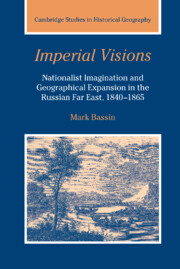 Imperial Visions
Imperial Visions Published online by Cambridge University Press: 06 July 2009
In framing the intentions of this study, the point was made at the outset that it would differ from narrative histories of Russia's incorporation of the Amur region, among other things by virtue of the fact that it would not attempt to explain the “why” of the annexation. To be sure, the story I have told offers insights – some of them telling – into this important question, but no argument as such is made, for the main point of the work involves something rather different. More than anything, Imperial Visions is an excavation of a geographical vision, which seeks to reconstruct and analyze the images through which Russians thought about and signified the Far East in the period under consideration. The rationale for this seemingly rather rarefied exercise, which the present work shares with a larger literature on envisioning, derives from the supposition that the images of a remote and little-known region can provide insight into the mind and culture of the individuals, groups, and societies that entertained them. Geographical visions, that is to say, can be taken as cultural artefacts, and as such they unintendedly betray the predilections and prejudices, the fears and hopes of their authors. Examining how a society perceives, ponders, and signifies a foreign place, – in other words, is a fruitful way of examining how the society – or parts of it – perceives, ponders, and signifies itself.
To save this book to your Kindle, first ensure [email protected] is added to your Approved Personal Document E-mail List under your Personal Document Settings on the Manage Your Content and Devices page of your Amazon account. Then enter the ‘name’ part of your Kindle email address below. Find out more about saving to your Kindle.
Note you can select to save to either the @free.kindle.com or @kindle.com variations. ‘@free.kindle.com’ emails are free but can only be saved to your device when it is connected to wi-fi. ‘@kindle.com’ emails can be delivered even when you are not connected to wi-fi, but note that service fees apply.
Find out more about the Kindle Personal Document Service.
To save content items to your account, please confirm that you agree to abide by our usage policies. If this is the first time you use this feature, you will be asked to authorise Cambridge Core to connect with your account. Find out more about saving content to Dropbox.
To save content items to your account, please confirm that you agree to abide by our usage policies. If this is the first time you use this feature, you will be asked to authorise Cambridge Core to connect with your account. Find out more about saving content to Google Drive.